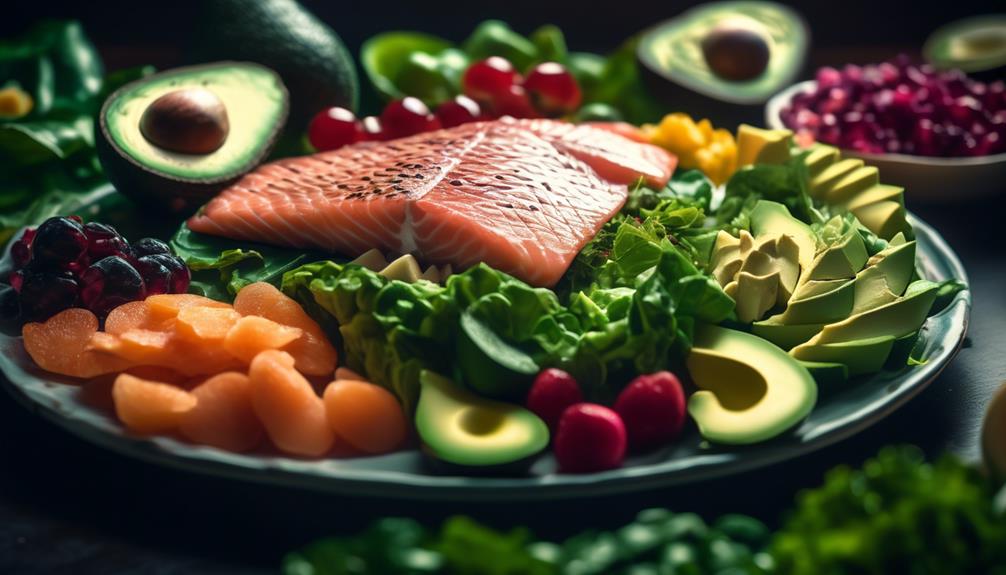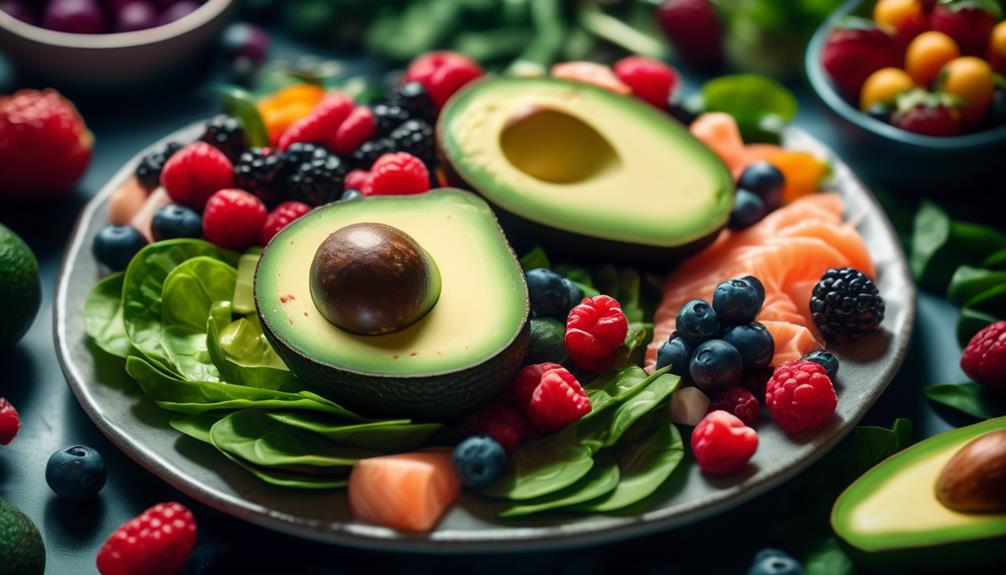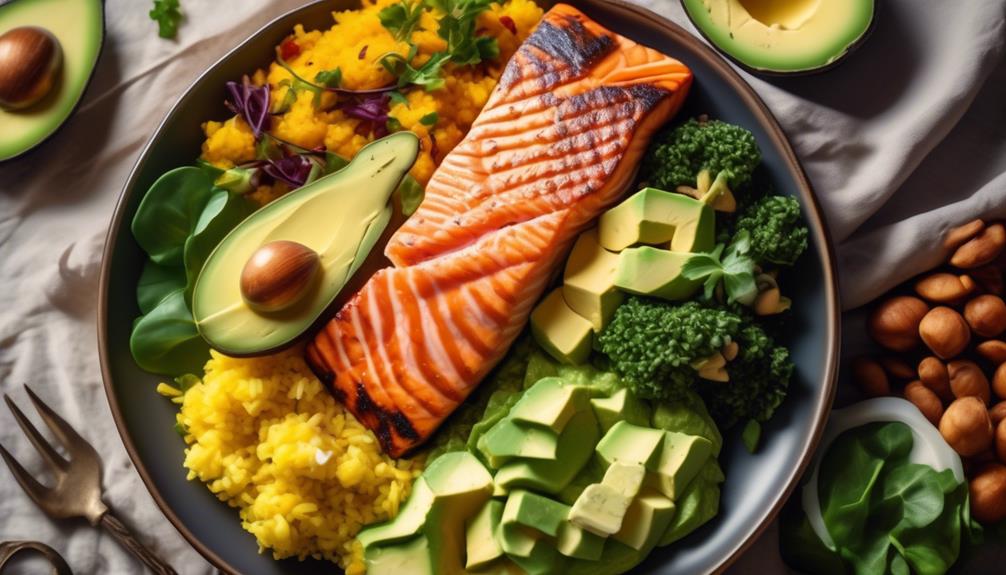Are you tired of feeling sluggish and dealing with constant inflammation? Well, it's time to spice things up and give your wellness routine a kickstart!
Keto recipes may just be the secret weapon you've been searching for. But why, you ask? Let's dive into the science behind it and explore how these recipes can effectively reduce inflammation and promote overall wellness.
Get ready to discover a whole new way of fueling your body that will leave you feeling revitalized and ready to take on the world.
The Science Behind Keto and Inflammation

The science behind the keto diet and its impact on inflammation is a fascinating area of research that offers valuable insights into promoting wellness. When it comes to gut health, the keto diet has shown promising results. By significantly reducing carbohydrate intake and increasing fat consumption, the keto diet can lead to a reduction in gut inflammation. This is because carbohydrates can contribute to gut dysbiosis, which is an imbalance of the gut microbiota. By eliminating or greatly reducing these carbohydrates, the keto diet promotes a healthier gut environment.
Furthermore, the keto diet has also been studied for its potential benefits in managing autoimmune diseases. Autoimmune diseases occur when the immune system mistakenly attacks healthy cells in the body. Inflammation is a common feature of autoimmune diseases, and the keto diet has been shown to have anti-inflammatory effects. By reducing carbohydrate intake and increasing fat consumption, the keto diet can help regulate the immune response and reduce inflammation in people with autoimmune diseases.
While research on the keto diet and inflammation is still ongoing, these preliminary findings suggest that the keto diet may have a positive impact on gut health and autoimmune diseases.
It's important to note that the keto diet isn't a one-size-fits-all approach and should be tailored to individual needs and health conditions. Consulting with a healthcare professional or registered dietitian is recommended before starting any new diet or making significant dietary changes.
How the Ketogenic Diet Promotes Wellness
The ketogenic diet promotes wellness through its anti-inflammatory properties and ability to improve metabolic health.
By reducing carbohydrate intake and increasing healthy fat consumption, the ketogenic diet helps to reduce inflammation in the body, which is a common driver of chronic diseases.
Additionally, the diet promotes improved metabolic health by encouraging the body to burn fat for fuel instead of carbohydrates, leading to weight loss and increased energy levels.
Anti-Inflammatory Properties
Promote wellness and reduce inflammation with the ketogenic diet, a powerful tool for improving overall health. Incorporating anti-inflammatory foods into your diet is crucial for reducing inflammation and promoting optimal wellness. The ketogenic diet, with its emphasis on high-fat, low-carbohydrate foods, has been shown to have numerous benefits in this regard.
One of the main benefits of a ketogenic diet is its ability to reduce inflammation in the body. By limiting the intake of carbohydrates, which can lead to spikes in blood sugar and inflammation, the ketogenic diet helps maintain stable blood sugar levels and reduces the production of inflammatory markers in the body.
Additionally, the ketogenic diet encourages the consumption of foods that are rich in omega-3 fatty acids, such as fatty fish and nuts. Omega-3 fatty acids have been shown to have potent anti-inflammatory properties, reducing the risk of chronic diseases linked to inflammation.
Improved Metabolic Health
To further enhance your wellness journey, let's explore how the ketogenic diet contributes to improved metabolic health.
One of the key benefits of the ketogenic diet is its ability to promote improved weight management. By restricting carbohydrates and increasing healthy fats, the body enters a state of ketosis, where it burns fat for fuel instead of relying on carbohydrates. This shift in metabolism can lead to a more efficient calorie burn, making it easier to maintain a healthy weight.
Additionally, the ketogenic diet has been shown to reduce the risk of chronic diseases such as type 2 diabetes, heart disease, and certain types of cancer. By reducing inflammation and stabilizing blood sugar levels, the diet supports overall metabolic health and promotes long-term wellness.
The Role of Ketones in Reducing Inflammation

Ketones play a crucial role in reducing inflammation in the body. When you follow a ketogenic diet, your body enters a state of ketosis, where it produces ketones for energy instead of relying on glucose.
This shift in fuel source has been found to have anti-inflammatory effects, which can help reduce inflammation and promote overall wellness.
Ketones and Inflammation
Reducing inflammation can be supported by incorporating a ketogenic diet. Ketones have been shown to play a significant role in mitigating inflammation. When you follow a ketogenic diet, your body switches from using glucose as its primary fuel source to using ketones, which are produced from stored fats. This metabolic shift can have a positive impact on inflammation.
Research has shown that ketones have anti-inflammatory effects by reducing the production of inflammatory markers in the body. Additionally, ketosis, the state in which your body produces and utilizes ketones, has been linked to weight loss. By reducing excess body fat, you can also reduce inflammation, as fat cells release pro-inflammatory molecules.
Benefits of Ketosis
By adopting a ketogenic diet and entering into ketosis, you can tap into the benefits of ketones in reducing inflammation and promoting overall wellness. Ketosis, the metabolic state where your body primarily uses ketones for fuel instead of glucose, has been shown to have a positive impact on inflammation markers in the body.
Inflammation is a natural immune response that helps protect the body from injury and infection. However, chronic inflammation can lead to various health issues, including autoimmune diseases, cardiovascular diseases, and obesity. Research suggests that ketosis can help reduce inflammation by inhibiting the production of pro-inflammatory molecules and promoting the release of anti-inflammatory molecules.
Additionally, ketones have been found to modulate the immune system response, further contributing to the anti-inflammatory effects of ketosis. Incorporating keto recipes into your diet can therefore support your body in reducing inflammation and promoting overall wellness.
Anti-Inflammatory Effects
Incorporating a ketogenic diet into your lifestyle can have a significant impact on reducing inflammation and promoting overall wellness.
One of the key reasons for this is the role of ketones in reducing inflammation. Inflammation is a natural response of the body to injury or infection, but chronic inflammation can lead to a host of health problems.
Research suggests that ketones, which are produced when the body is in a state of ketosis, have anti-inflammatory effects. They can inhibit the production of pro-inflammatory molecules and activate pathways that reduce inflammation.
This is why a ketogenic diet, which focuses on low-carb, high-fat foods, can be an effective natural remedy for inflammation. By reducing inflammation, you can improve your overall health and well-being.
Keto Recipes and Anti-Inflammatory Foods

To promote wellness and reduce inflammation, incorporating keto recipes that focus on anti-inflammatory foods can be highly beneficial.
The ketogenic diet, with its emphasis on low-carb, high-fat foods, has gained popularity for its potential to aid in weight loss and improve overall health. But did you know that certain keto recipes can also help combat inflammation?
One of the key principles of the keto diet is to minimize the consumption of processed foods and sugars, both of which have been linked to increased inflammation in the body. Instead, keto recipes emphasize whole foods that are rich in healthy fats, lean proteins, and non-starchy vegetables.
These anti-inflammatory keto recipes often include ingredients such as avocados, fatty fish like salmon, olive oil, nuts, and seeds. These foods are packed with omega-3 fatty acids, which have been shown to reduce inflammation in the body. They also contain antioxidants, vitamins, and minerals that can support overall wellness and boost the immune system.
If you're new to the keto diet, incorporating these anti-inflammatory recipes can be a great way to get started. Not only will they help reduce inflammation, but they can also aid in weight loss and provide you with the nutrients your body needs to thrive.
Key Nutrients in Keto Recipes for Wellness
One important aspect of incorporating anti-inflammatory keto recipes into your diet is understanding the key nutrients they provide for promoting overall wellness. These recipes aren't only low in carbohydrates but also rich in essential nutrients that support your health.
Here are four key nutrients you can find in keto recipes:
- Healthy fats: Keto recipes often include healthy fats like avocados, olive oil, and coconut oil. These fats provide a concentrated source of energy and help keep you satisfied. They also play a crucial role in supporting brain function and reducing inflammation in the body.
- Protein: Protein is an essential nutrient for building and repairing tissues, and it plays a vital role in maintaining muscle mass. Keto recipes often include protein-rich foods like lean meats, eggs, and fish, which provide the necessary amino acids for optimal health.
- Fiber: Although keto diets are low in carbohydrates, it's still important to include sources of fiber. Fiber promotes digestive health, helps regulate blood sugar levels, and supports a healthy weight. Incorporate low-carb vegetables like broccoli, spinach, and cauliflower into your keto recipes to increase your fiber intake.
- Vitamins and minerals: Keto recipes can be a great source of vitamins and minerals. Foods like leafy greens, nuts, and seeds are rich in vitamins A, C, E, and minerals like magnesium and potassium. These nutrients are essential for maintaining a strong immune system and supporting overall wellness.
Tips for Incorporating Keto Recipes Into Your Diet

If you're looking to incorporate keto recipes into your diet, here are some practical tips to help you get started on your journey towards better health and wellness.
One of the key aspects of a successful keto diet is meal prepping. Planning and preparing your meals in advance can save you time and ensure that you have keto-friendly options readily available. Start by creating a meal plan for the week and make a shopping list based on that plan.
Stock your kitchen with keto staples such as lean meats, low-carb vegetables, healthy fats like avocados and olive oil, and nuts and seeds. When meal prepping, cook large batches of keto recipes like cauliflower rice, roasted vegetables, or grilled chicken to have on hand throughout the week. This will make it easier to stick to your keto diet and avoid reaching for unhealthy options when you're hungry and pressed for time.
Staying motivated on a keto diet can be challenging, but there are strategies you can use to stay on track. Firstly, set realistic goals and track your progress. Keep a food diary or use a tracking app to monitor your daily intake of carbs, fats, and proteins. Celebrate your achievements and milestones along the way to stay motivated.
Surround yourself with a supportive community, whether it's through online forums or local keto groups. Connecting with others who are also following a keto diet can provide encouragement and accountability. Experiment with new keto recipes and flavors to keep your meals interesting and prevent boredom.
Keto Recipes for Breakfast and Inflammation Reduction
Reducing inflammation and promoting wellness through a keto diet can begin with incorporating nutritious and delicious keto recipes into your breakfast routine. Breakfast is an important meal that sets the tone for the rest of the day, and choosing the right keto recipes can help you start your day on a healthy note. Here are some keto recipes for breakfast that can aid in reducing inflammation and promoting overall wellness:
- Keto Avocado and Bacon Egg Cups: These egg cups are packed with healthy fats from avocados and bacon, providing a satisfying and nutritious start to your day. Avocados are rich in monounsaturated fats, which have been shown to reduce inflammation in the body.
- Keto Chia Pudding: Chia seeds are an excellent source of omega-3 fatty acids, which have anti-inflammatory properties. This creamy and delicious chia pudding can be topped with berries and nuts for added flavor and nutrients.
- Keto Green Smoothie: A green smoothie made with leafy greens like spinach or kale, along with low-carb fruits like berries, can provide a refreshing and nutrient-dense breakfast option. Leafy greens are packed with antioxidants that can help reduce inflammation.
- Keto Coconut Yogurt Parfait: Coconut yogurt is a great dairy-free alternative that's rich in medium-chain triglycerides (MCTs), which have been shown to have anti-inflammatory effects. Layer it with nuts, seeds, and berries for a delicious and satisfying breakfast parfait.
Keto Recipes for Lunch and Inflammation Reduction

To continue your journey towards reducing inflammation and promoting wellness through a keto diet, let's explore some flavorful and nutritious keto recipes for lunch.
Following a keto diet can provide numerous benefits for inflammation reduction, as it focuses on minimizing carbohydrates and increasing healthy fats and protein. By incorporating these keto lunch ideas into your diet, you can enjoy delicious meals while supporting your overall well-being.
One tasty option is a keto-friendly salad with grilled chicken, avocado, and mixed greens. Avocado is rich in monounsaturated fats, which have been shown to reduce inflammation in the body. Pairing it with grilled chicken provides a good source of protein and essential amino acids.
Another idea is a cauliflower rice bowl with salmon and roasted vegetables. Salmon is high in omega-3 fatty acids, which have potent anti-inflammatory properties. Cauliflower rice serves as a low-carb alternative to traditional rice, helping to maintain ketosis. Roasted vegetables add flavor and provide a variety of essential nutrients.
Keto Recipes for Dinner and Inflammation Reduction
For a satisfying and anti-inflammatory dinner on your keto journey, try these flavorful recipes that will nourish your body and support overall wellness. Incorporating keto recipes into your dinner routine can have a positive impact on both gut health and joint pain relief.
Here are four delicious options to consider:
- Keto Salmon with Avocado Salsa: This recipe combines omega-3 rich salmon with creamy avocado salsa, providing essential nutrients for optimal gut health. The healthy fats in salmon can reduce inflammation, while the avocado adds fiber and beneficial antioxidants.
- Keto Turmeric Chicken Curry: Turmeric, a spice known for its anti-inflammatory properties, is the star of this dish. Combined with chicken and coconut milk, it creates a flavorful curry that supports joint pain relief. Serve it with cauliflower rice for a low-carb option.
- Keto Beef Stir Fry with Vegetables: This quick and easy recipe features tender beef cooked with a variety of colorful vegetables. The combination of lean protein and fiber-rich veggies promotes gut health and reduces inflammation.
- Keto Zucchini Noodles with Pesto and Grilled Chicken: Swap traditional pasta for zucchini noodles to create a low-carb dish that supports gut health. Topped with homemade pesto and grilled chicken, this meal is packed with nutrients and flavor.
Conclusion
In conclusion, the ketogenic diet and its recipes can be an ideal choice for reducing inflammation and promoting overall wellness.
Scientific evidence supports the role of ketones in reducing inflammation, and the diet provides a range of anti-inflammatory foods and key nutrients.
By incorporating keto recipes into your diet, you can support your body's wellness goals and enjoy delicious meals that are both evidence-based and practical for everyday life.
Start exploring the world of keto recipes today and experience the benefits for yourself.







